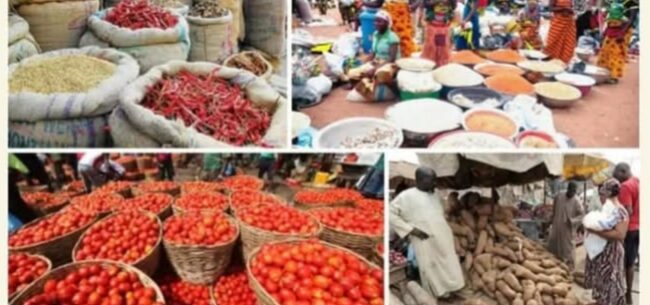Food and agriculture stakeholders in Ogun, Oyo, and Kwara States have expressed delight at the drop in food prices, praising the Federal Government for its policies and interventions.
In Tuesday’s survey of the News Agency of Nigeria, the respondents, however, cautioned that some loose ends needed to be tidied up to sustain the price reductions across the board.
At the Lafenwa, Kuto, and Olomore markets in Abeokuta, the survey revealed a significant drop in the prices of rice, beans, garri, groundnut oil, and yams.
It also showed that the prices of perishable items like peppers, onions, and tomatoes had dropped.
According to the survey, a ‘kongo’ of garri now sells for N400 as against N1,800 in August, while a bag of the commodity now costs N28,000, compared to N40,000 in August.
A 50kg bag of rice now sells for N51,000 from N68,000, while ‘Oloyin’ beans dropped from N70,000 to N60,000.
A 5-litre gallon of groundnut oil, which was sold for N16,000, now costs N13,000, while a 25-litre keg of King’s oil reduced from N70,000 to N66,000.
A medium basket of onions has dropped from N20,000 to N12,000, while a small basket of the same commodity has reduced from N10,000 to N5,000.
Similarly, a big bag of scotch bonnet pepper now goes for between N35,000 and N40,000, dropping from N60,000 and N65,000, respectively.
The small bucket of bonnet pepper, which previously sold for N15,000, now costs N6,000, just as a bag of tomatoes dropped from N70,000 to N50,000.
Meanwhile, six big tubers of yams, earlier sold between N17,000 and N20,000, now sell for N12,000, while medium sizes are sold between N4,000 and N6,000.
Some of the traders attributed the reduction to the recent decline in the exchange rate and reopening of land borders.
This, according to Sikirat Soyeye, a grain seller at Lafenwa market, has eased importation and improved the availability of food items, especially rice and groundnut oil.
“Our businesses have improved; since food items are now cheaper, people are now buying more.
“The reduction in the dollar rate and border reopening have really helped,” she said.
Soyeye, however, appealed to the government to sustain the stability of the naira, adding that traders now record higher sales and patronage.
At the Kuto Market, Tinuke Ayomide, a perishable goods seller, said the reduction in the prices of pepper and onions was due to the current harvest season of the items.
Ayomide, however, urged the government to strengthen security, particularly in the northern parts of the country where most food items originate, to ensure a steady reduction in commodity prices.
Similarly, a tomato seller at Olomore market, Mr Haruna Ibrahim, said the commodity recorded a slight price reduction, but compared with other items, it was still expensive.
Ibrahim also attributed the drop in perishable food prices to seasonal harvests.
A buyer, Ayomide Adedeji, expressed delight at the development, urging the government to sustain the trend through consistent policies.
“Food prices should not rise again, and the government must keep fuel prices stable.
“When the dollar comes down, things become cheaper, so the government must ensure exchange rate stability and continue to support local farmers,” she said.
The Ogun Secretary, All Farmers Association of Nigeria, Abiodun Ogunjimi, said the current price reduction reflected a mix of seasonal harvests, reduced transport costs, and improved supply from farms and borders.
Ogunjimi, however, warned that without deliberate government policies, the gains might be temporary.
“To sustain this positive trend, the government should invest in local food production, reduce import duties on essential goods, and provide incentives for farmers.



